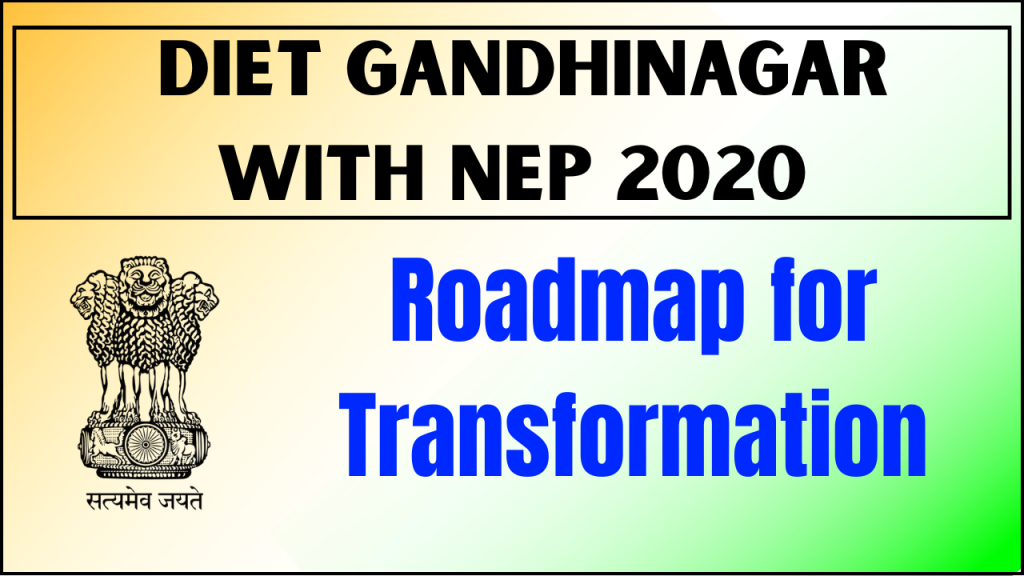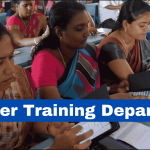
The National Education Policy (NEP) 2020 has opened a new chapter in the Indian education system. It aims to build a more flexible, inclusive, and creative learning environment. One of its key focus areas is transforming teacher education. In this journey, District Institutes of Education and Training (DIETs) have a major role to play.
Let’s explore how DIET Gandhinagar can align itself with NEP 2020 and become a model for innovation, collaboration, and progress in teacher training.
1. Understanding NEP 2020 Goals for Teacher Education
Before making changes, it’s important to understand what NEP 2020 says about teacher education. The policy talks about:
- Creating well-rounded and passionate teachers.
- Making teacher training more practical and hands-on.
- Encouraging flexibility and choice in learning.
- Promoting collaboration between institutions.
- Integrating technology and innovation in teaching methods.
With these goals in mind, DIET Gandhinagar can build a clear path forward.
2. Making Teacher Training Flexible
NEP 2020 encourages flexibility in courses and curriculum. Here’s how DIET Gandhinagar can support this:
- Offer Choice-Based Courses: Instead of fixed subjects, let trainees pick electives that match their interests—like art, environment, or digital tools.
- Blend Online and Offline Learning: Introduce hybrid learning models. Trainees can attend classes in person, but also learn from online resources at their own pace.
- Modular Programs: Break long courses into short, focused modules. This way, teachers can join as per their time and need.
3. Hands-On and Practical Learning
Theory is important, but NEP 2020 wants more practice-based learning. DIET Gandhinagar can:
- Strengthen School Internships: Give trainee teachers more time in real classrooms. They should observe, assist, and then lead teaching sessions.
- Skill-Based Workshops: Hold regular sessions on classroom management, child psychology, storytelling, etc.
- Reflective Practice: Ask trainees to maintain teaching diaries, share experiences, and learn from real classroom challenges.
4. Promoting Collaboration
NEP 2020 highlights collaboration among institutions and professionals. DIET Gandhinagar can:
- Partner with Local Schools: Work closely with government and private schools for internships, feedback, and training.
- Link with Higher Education Institutions: Connect with nearby universities and B.Ed. colleges for joint programs, guest lectures, and shared resources.
- Engage with NGOs and Experts: Invite education experts, social workers, and NGOs to share best practices and case studies.
5. Using Technology for Smarter Teaching
Technology is a key enabler in NEP 2020. DIET Gandhinagar can become a tech-savvy institution by:
- Smart Classrooms: Equip training rooms with projectors, digital boards, and internet connectivity.
- Digital Tools Training: Train future teachers to use apps like Google Classroom, Canva, Kahoot, and other EdTech platforms.
- Online Resource Library: Create an easy-to-access digital library with e-books, lesson plans, and video lectures.
6. Encouraging Innovation in Teaching
To make learning joyful and effective, DIET Gandhinagar must foster innovation. Here’s how:
- Idea Labs: Set up small labs where teachers can try new teaching methods and materials.
- Innovation Competitions: Organize monthly or quarterly contests where trainee teachers present creative lesson plans or classroom ideas.
- Field Exposure Visits: Take trainees to innovative schools, community learning centers, or educational exhibitions.
7. Focus on Multilingualism and Cultural Sensitivity
NEP 2020 values language diversity and cultural roots. DIET Gandhinagar can:
- Promote Mother Tongue Use: Train teachers to be comfortable using Gujarati as well as English or Hindi in classrooms.
- Cultural Projects: Encourage lessons based on local stories, songs, and traditions.
- Inclusive Practices: Train teachers to be sensitive to children from all backgrounds—rural, tribal, urban, etc.
8. Capacity Building for Faculty
To bring all these changes, the faculty at DIET also needs to grow. The institute can:
- Organize Regular Training: Faculty members should attend national and international workshops.
- Encourage Research and Publishing: Motivate trainers to study and write about local education challenges and solutions.
- Peer Learning: Arrange faculty exchange programs with other DIETs or institutions.
9. Creating a Feedback and Reflection System
To keep improving, DIET Gandhinagar should listen to those it serves. A good system will include:
- Regular Feedback from Trainees: What worked? What didn’t? This helps improve the program.
- School Feedback: After trainees finish internships, schools can give feedback on their performance.
- Self-Evaluation Tools: Encourage both students and teachers to reflect on their work and learning.
10. Building a Strong Vision for the Future
To align with NEP 2020, DIET Gandhinagar needs a clear, shared vision. This can be built by:
- Creating a Five-Year Action Plan: Set goals for the next 5 years—what to achieve each year, and how.
- Involving All Stakeholders: Teachers, trainees, school leaders, parents, and the local community must be part of this transformation.
- Celebrating Progress: Small wins should be celebrated. It keeps motivation high and builds pride in the institution.
The Way Forward
NEP 2020 offers a golden opportunity to reinvent teacher education in India. DIET Gandhinagar has all the potential to lead this change. By focusing on flexibility, collaboration, innovation, and cultural sensitivity, it can become a hub of high-quality teacher training.
The road ahead is exciting. With commitment, creativity, and community support, DIET Gandhinagar can turn the vision of NEP 2020 into a powerful reality.









